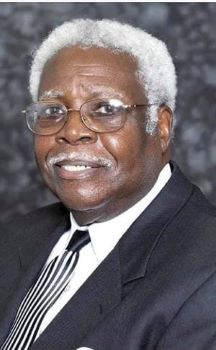Abe E. Pierce III facts for kids
Quick facts for kids
Abe Edward Pierce III
|
|
|---|---|
 |
|
| Mayor of Monroe | |
| In office July 1, 1996 – July 3, 2000 |
|
| Preceded by | Robert E. "Bob" Powell |
| Succeeded by | Melvin Rambin |
| Personal details | |
| Born | October 28, 1934 Monroe, Louisiana |
| Died | August 1, 2021 (aged 86) |
| Nationality | American |
| Political party | Democratic |
| Spouse | Dorothy Richard-Pierce (married 1955) |
| Children | Including: Abe E. Pierce IV |
| Alma mater | Southern University |
| Occupation | Educator |
Abe Edward Pierce III (born October 28, 1934 – died August 1, 2021) was an important American educator and politician. He was born in Monroe, Louisiana. Mr. Pierce made history as the first African American mayor of his hometown. He was a member of the Democratic Party. He served as mayor for one term, from 1996 to 2000. After his term, he was succeeded by Melvin Rambin.
Contents
Who Was Abe Pierce?
Early Life and Education
Abe Pierce grew up in Monroe, Louisiana. He went to the Monroe Colored High School. This was before schools were desegregated. Desegregation meant that schools became open to students of all races. After high school, he attended Southern University in Baton Rouge. This is a historically black university.
A Career in Education
Mr. Pierce started his career as a teacher. For ten years, he taught science subjects. These included biology, chemistry, and physics. He taught at Richwood High School in Monroe. He even served briefly as the principal there. Later, he moved into school administration. He became a supervisor for secondary education. Then he was an assistant superintendent. He once shared that his first teacher salary was $240 a month.
His wife, Dorothy Richard-Pierce, was also a teacher. She was from Opelousas. Mr. Pierce said that teaching was his favorite job. He also owned a small business with a friend. It was called Pierce's Dairy Delight.
Community Leadership and Civil Rights
Before becoming mayor, Mr. Pierce was very active in his community. He served for 26 years on the Ouachita Parish Police Jury. This group helps govern the parish (like a county). He was the first African American to serve on this jury. He was also the first African American to be its president.
Mr. Pierce was also involved in the Civil Rights Movement. He was the president of the youth council for the Monroe branch of the National Association for the Advancement of Colored People (NAACP). The NAACP is a group that works for equal rights. He said his political journey began at his church. It was the New Tabernacle Baptist Church in Monroe.
Abe Pierce as Mayor
Becoming Mayor in 1996
In 1996, Abe Pierce ran for mayor of Monroe. This election was a nonpartisan blanket primary. This means candidates from all parties run together. Mr. Pierce was one of six candidates. He received the most votes in the first round. He got 5,584 votes, which was 35.5 percent.
He then went into a runoff election. His opponent was John Bryant. Mr. Pierce won the runoff by a small margin. He received 9,874 votes (51 percent). He took office as mayor on July 1, 1996. The day before, he left his job with the school board after 40 years.
Seeking Reelection in 2000
Mr. Pierce ran for mayor again in 2000. Mayoral elections in Monroe happen at the same time as presidential primaries. In that election, he lost to Melvin Rambin. Mr. Rambin received 9,042 votes (53.8 percent). Mr. Pierce received 7,219 votes (43 percent).
Mr. Pierce believed his defeat was due to low voter turnout. He noted that many registered Black voters did not come to the polls. However, many white voters did turn out. They largely voted for Mr. Rambin. Sadly, Mayor Rambin passed away less than a year into his term.
Later Life and Legacy
After Mayor Rambin's death, Jamie Mayo became the interim mayor. Mr. Mayo was also an African American. He later won special elections and full terms as mayor.
Abe Pierce ran for mayor one more time in 2004. He was 69 years old. He finished fourth in that election. He continued to live in Monroe until he passed away in 2021. He was 86 years old. Shortly after his death, the Monroe City Council honored him. They voted to rename the Monroe Convention Center after him. This was a way to remember his important contributions to the city.
 | Frances Mary Albrier |
 | Whitney Young |
 | Muhammad Ali |

